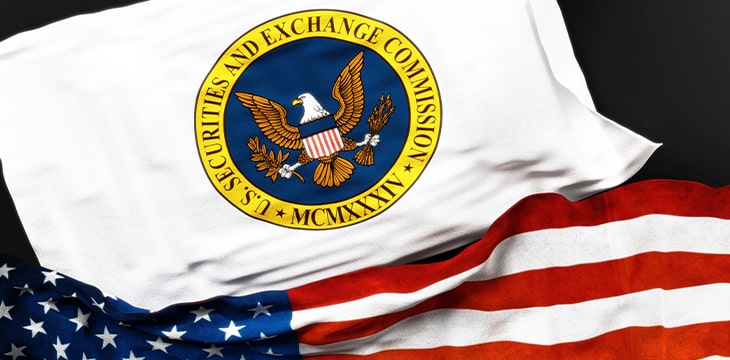|
Getting your Trinity Audio player ready...
|
Despite the world burning down around Grayscale, the industry’s exchange-traded product (ETP) that never was, is forging ahead in its attempt to gain formal ETP status from the Securities and Exchange Commission (SEC). On Friday, it filed its latest round of arguments urging the D.C. Circuit to vacate the SEC’s rejection, repeating prior allegations that the SEC has taken an inconsistent and impermissible approach toward Grayscale’s spot-market ETP compared to similar approvals granted to futures-based ETPs.
Final briefs from both sides are due in early February, at which point the case will accelerate toward oral arguments. How did we get here, and where does each side stand?
Why did the SEC reject Grayscale’s ETP?
The case arises from an application by the NYSE Arca exchange to list Grayscale’s proposed exchange-traded product (ETP), Grayscale. Grayscale’s proposed product is essential to convert the Grayscale Trust (GBTC) into an exchange-traded product that could be traded directly on the NYSE Arca exchange. Currently, without this status, GBTC can only be issued to certain accredited investors; the public can only purchase GBTC on the secondary market, where it sits at an enormous discount to the Trust’s net-asset value (the value of all the BTC under the Trust’s control).
For an exchange to list a new product, it must effect a rule change in accordance with the Securities Exchange Act. Under the Act, any rule change requires SEC approval. The SEC ‘shall disapprove’ a rule change unless it is consistent with the provisions of the Act governing exchanges. One of these provisions mandates that a proposed rule must be “designed to prevent fraudulent and manipulative acts and practices, to promote just and equitable principles of trade,” and “to protect investors and the public interest.”
Perhaps most importantly, the burden lies on the exchange proposing the rule change to demonstrate that such change is consistent with the Exchange Act.
The SEC rejected the proposed rule change in June 2022 on the basis of “several identified risks of fraud and manipulation facing investors in spot Bitcoin.” Among those listed were:
- the risk of wash trading in order to manipulate the BTC price,
- security vulnerabilities on the BTC network,
- the risk of insider trading or trading based on false or misleading information,
- potential manipulative activity enabled by stablecoins
- fraud and manipulation at BTC trading platforms
The legal arguments
Both sides have made updated submissions in recent weeks: the SEC’s latest brief was filed in December, while Grayscale’s response was filed just a few days ago.
Grayscale’s case is that the SEC’s rejection amounted to a violation of the Administrative Procedure Act (APA), which governs rulemaking by federal agencies, and the “express statutory command that a national security exchange’s rules do not discriminate among securities issuers.”
In particular, Grayscale complains that the SEC’s treatment of their proposed product is inconsistent with its approach to similar products: in particular, they point to the SEC’s decision to approve two proposals for products that hold bitcoin futures as assets. Grayscale says there’s no basis for the difference in treatment: “the price of Bitcoin futures is subject to the identical risk of fraud and manipulation as the spot price of Bitcoin.” To them, a spot-based ETP and a futures-based ETP are functionally identical as the price of both is tightly correlated due to market arbitrage mechanisms. Thus, they argue, any manipulation likely to happen in the spot market would have an equal chance of being reflected in the futures market.
The consequence of this is that the SEC has unfairly discriminated against Grayscale compared to the previously-approved futures-based ETPs.
It also blames the SEC’s refusal for the steep discount at which GBTC shares are currently trading, thereby depriving the 850,000 GBTC investors of billions of dollars in value—a somewhat disingenuous attempt to shrug off blame considering the most immediate cause of GBTC’s woes have been rampant fraud and manipulation in digital asset markets including via the very product for which Grayscale is now attempting to gain regulatory approval.
In a response filed in December, the SEC points out that the two approvals cited by Grayscale were for products that held BTC futures which trade directly on the Chicago Mercantile Exchange, which is a highly regulated market that performs ‘extensive surveillance of the trading activity on its market.’ Grayscale’s proposed product, in contrast, would hold BTC that trades on entirely unregulated markets. It criticizes Grayscale’s characterization of the SEC’s approach, pointing out that it is not that the risk of fraud is higher in the spot market than the futures market but that the capacity for a regulator to detect such fraud is there on the futures market while absent in the other.
The usual suspects weigh in
As with more or less any regulatory action in the digital asset industry, the SEC’s continued denial of the Grayscale ETP has drawn ample comment. Most of this focuses on concern for the health of currently issued GBTC shares and decrying the billions of dollars that investors will miss out on if the SEC’s rejection should be allowed to stand.
Advocacy group The Chamber of Digital Commerce released a 31-page report on why the SEC has erred in rejecting the ETF, lamenting the SEC’s resistance to what it calls an ‘important investment product’ and arguing that the SEC’s market manipulation concerns are unfounded and its concerns over the risk of fraud’ counterproductive.’
It also inspired the submission of several amicus curiae briefs in support of Grayscale, including from Coinbase. In the SEC’s submissions, they cite Coinbase’s (NASDAQ: COIN) position that voluntary regulation by the private market is sufficient to douse the SEC’s market manipulation and fraud concerns.
Another bundle of amicus curiae briefs was submitted by a group of former regulators and legal and financial scholars, who collectively had this to say:
“Inherent in the goal of investor protection is investor choice: the freedom to make well-informed decisions about how best to invest capital among available opportunities.”
They argue, like the SEC, that the commission’s distinction between the spot and futures market for the purpose of granting authorization to an ETP is arbitrary, again saying that the risk of fraud and manipulation is equal in both.
Where is this headed?
Grayscale’s argument is in part based on a plain misreading of the Securities rules: where they allege that the SEC must not reach a decision that unfairly discriminates between issuers, the rule they cite, in fact, requires that exchanges cannot introduce practices that unfairly discriminate between issuers.
Ignoring that, the core thrust of Graysacle’s argument is that the SEC’s treatment of their proposed spot-ETF is arbitrary and inconsistent with its own prior decisions. This is also a problematic argument because the SEC has consistently rejected spot-based ETFs on largely the same reasoning as was used in the Grayscale rejection: the lack of a regulated market for spot Bitcoin and the consequent lack of measures to prevent fraudulent and manipulative practices.
This includes the rejection of the proposed SolidX spot-based ETP and a similar attempt by the Winklevoss twins in 2018.
Grayscale can quibble with the SEC’s reasoning, but that reasoning has been entirely consistent.
On the other hand, Grayscale may have a point that, for practical purposes, the SEC’s view of the spot market as being distinct from the futures market is ‘a distinction without a difference.’ Futures prices and spot prices will run close together in most instances, and any fraud in the spot market might also be detected in the futures market: hence why Grayscale argues that the risk of fraud is the same between both markets.
But this is where the burden of proof is key: the onus is on the exchange applying for the rule change (NYSE Arca) to demonstrate that correlation in price would lead to a correlation in the detectability of fraud and manipulation. Thus, Grayscale would have to show that Arca successfully demonstrated this to the SEC and that the Commission was wrong in disregarding it.
Also not helpful to Grayscale is the fact that the CFTC, which regulates the futures market, is of the express opinion that its regulation of the futures market “does NOT provide for… value judgments about the underlying spot market.”
Using the presence of market controls in the futures market to carve out an argument that similar protections exist in the spot market would amount to an uncontrolled and unintended expansion of what is permitted under the law at a time when Congress is looking very carefully at how digital assets and their markets should be regulated.
Contrary to what the amicus curiae submissions suggest, for the SEC to suddenly change course in favor of Grayscale’s proposal when it has been rejecting similar projects on the exact same grounds without issue may be stepping on the toes of lawmakers.
And the SEC’s concerns surrounding the potential for market manipulation and fraud are clearly well-founded. The Bitcoin market has been replete with allegations of manipulation and fraud more or less since its conception. In 2021, FTX’s Sam Bankman-Fried was sued for trying to dump hundreds of BTC in an attempt to cause an artificial price movement and cause a chain of liquidations throughout the ecosystem. The attempt failed, but the lawsuit was apparently settled out-of-court before it could reach a more comprehensive conclusion.
BitMEX has faced similar allegations, being accused of basing its futures contracts on spot prices sourced from highly illiquid and easily manipulated exchanges so that it could artificially instigate margin calls on its own highly leveraged traders.
The timing could be better
Grayscale was already on shaky ground when it began pursuing its ETP approval. The industry has been suffering through a cyclone of fraud, manipulation, and the overall erosion of confidence in the time since. The SEC’s arguments are ones it has used to deny BTC ETFs in the past, and its concerns have only received further validation over the past 6-12 months.
Watch: SEC Commissioner Hester Peirce on Bitcoin Association’s Blockchain Policy Matters

 02-18-2026
02-18-2026 




